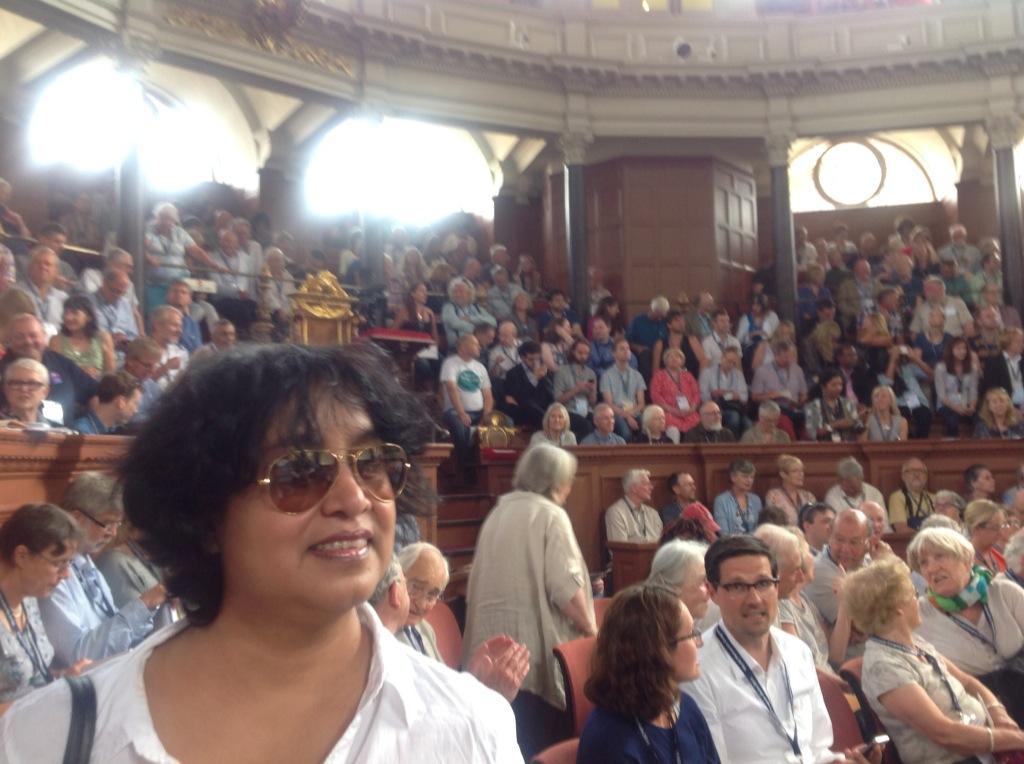Oh dear. A London-based reporter for Religion News Service, Brian Pellot, was at the Global Humanist Conference and was at Samira Ahmed’s interview with Dawkins and has a transcript. It’s rather dispiriting.
Dawkins said that his rape tweets were “absolutely not presented as provocation.” Asked if he regretted sending them, he said, “I don’t regret it as much as you want me to say I do.”
I don’t actually care whether he regrets sending them or not; I care much more about whether he sees the reasonable points many people have made. That would have been a better question, really, because asking him to express regret on stage in front of a thousand people is not likely to be fruitful. I’m not sure it’s even fair. (And why is it not fair? For reasons that have to do with emotions. It’s not a logical point, it’s a point about how people feel in certain kinds of situations.)
Anyway, judging by what he said, the upshot is that no, he doesn’t at all see the reasonable points many people have made. This is probably partly because he has lots of people telling him that everyone who has disagreed with him on this subject is a mere “rage-blogger” and can be safely and indeed virtuously ignored.
Now for the transcript:
Let’s take the first one: “Date rape is bad. Violent rape at knifepoint is worse.” The general point I was trying to make was a logical one, which was that to say that X is bad, Y is worse, should not ever be taken as an endorsement of the one that’s not so bad. You would be amazed at the number of people who take that to be an endorsement of X, to say X is OK, you can do X. That is logically absurd and it is pernicious.
Now the next point is, “why do you use rape?” rather than, somebody said, “Why don’t you say slapping someone around the face is bad, breaking their nose is worse.” I could have said that. It would have been completely pointless because it’s totally obvious and actually the general point is totally obvious. But you would be astonished at the number of people who I’ve seen on Twitter who when I say anything is bad, something else is worse, they will take it as an endorsement.
He contradicts himself there. In the first paragraph he says he was making a general logical point about X and Y. But then in the next paragraph he says making that point would have been completely pointless because it’s totally obvious.
Well quite: yes it would because yes it is. That’s one of the things we’ve been saying all along (“we” being the people who dissent from what he’s been saying on the subject for the past week). The general point is totally obvious and thus completely pointless. So that whole first paragraph? It turns out to be wrong. He’s not interested in the logic of the general point, he’s interested in the claim about rape and how to rank it on a scale of badness.
But why? Why be so interested in that? Yes, judges and juries sometimes have to be interested in it, prosecutors and defense lawyers have to be interested in it, but other than that? The need is not obvious.
I was trying to say something about logical thinking, but that logical point doesn’t raise its silly head in neutral cases like X and Y and in cases like giving somebody a slap around the face as distinct from breaking their nose. It doesn’t raise its head with that. It does raise its head when you’re talking about rape and pedophilia and possibly nothing else. Therefore, I wanted to make the point that we are rationalists, we are humanists, we are skeptics, we are atheists. Why have we allowed these two topics of rape and pedophilia to deprive us of our normal logical reasoning? We say, “Oh we don’t talk about that, that’s too sensitive.” [emphsis in original]
Oh god. That’s so wrong. It’s so wrong and fucked up and backassward.
Why do you think?? Jesus. It’s because they are fraught, emotional subjects. They cut to the bone for a lot of people. That’s just how it is – it’s in the nature of the experience. It’s not “irrational” or “unskeptic” to find those subjects fraught. It’s robotic to refuse to understand that they are fraught.
Change the example. See how it sounds.
I was trying to say something about logical thinking, but that logical point doesn’t raise its silly head in neutral cases like X and Y and in cases like giving somebody a slap around the face as distinct from breaking their nose. It doesn’t raise its head with that. It does raise its head when you’re talking about lynching and cross-burning and possibly nothing else. Therefore, I wanted to make the point that we are rationalists, we are humanists, we are skeptics, we are atheists. Why have we allowed these two topics of lynching and cross-burning to deprive us of our normal logical reasoning? We say, “Oh we don’t talk about that, that’s too sensitive.”
See what I mean? That looks like an incredibly fatuous and callous thing to say, doesn’t it. It jumps out at you. I don’t think Dawkins would ever say that. Yet for some reason he keeps insisting that rape and pedophilia should be talked about as calmly and robotically as a design plan for a parking lot.
So, yeah. It’s dispiriting.
(This is a syndicated post. Read the original at FreeThoughtBlogs.)











